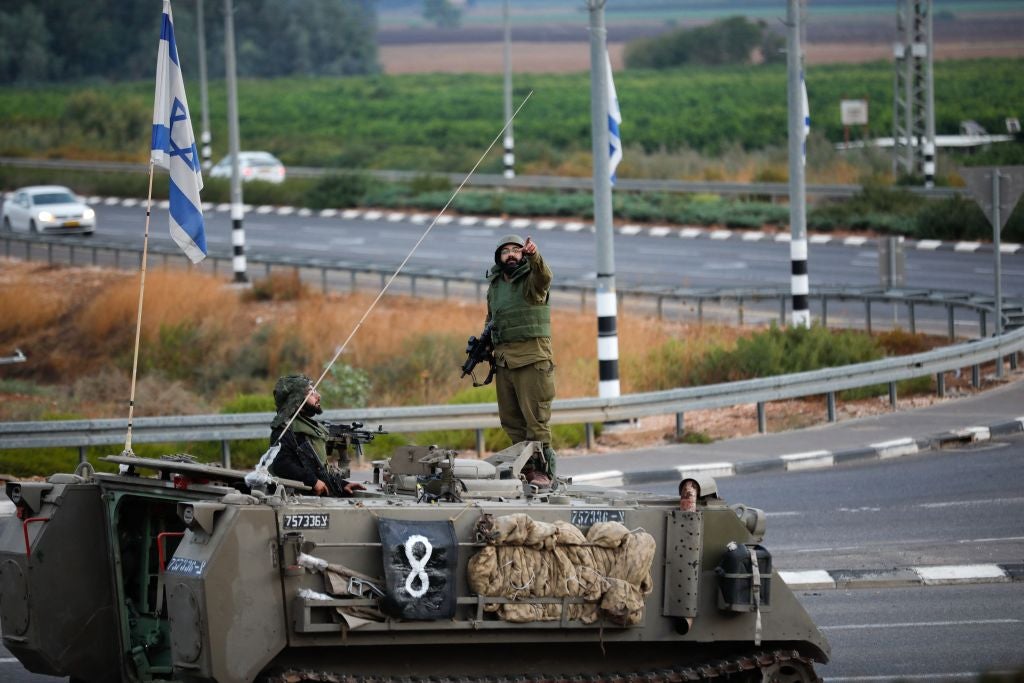
Following the 16 October announcement from the Israeli Defence Forces (IDF) of the evacuation of Israeli residents within 2km of Israel’s border with Lebanon, the former head of Israel’s National Security Council, Maj. Gen. (Ret) Yaakov Amidror, said that a cycle of escalation may lead to Hezbollah opening up a second front in the war but that the airforce has a considerably larger list of prepared targets.
Israel called up a reserve force of 300,000 personnel and deployed a substantial reservist force to the northern border, deploying more units to the north than at any time since the 1982 Lebanon war. While the spearhead of the regular army is deployed in Gaza, to the south, any delay reallocating this force to the north should have a negligible effect on the outcome, according to Amidror, as the initial stages of a war with Lebanon would be conducted through air strikes.
“The war in Lebanon would begin with a few long days where the air force, as in Gaza, will have to bomb all the targets that are on the prepared list,” he said. “So we have time, during which the air force continue to work in Lebanon, and then the ground forces can come in, and we will have to make a decision with the gap between the two sides.”
Amidror acknowledged that the threat from Hezbollah is much greater than Hamas, but stated that the the IDF are prepared, and that the change in magnitude of adversaries provided Israel with deeper strategic options than in the conflict with Hamas. “The targets in the list are also much more than in Gaza… If here we are in the tenth day [of air strikes in Gaza] and we didn’t finish the list, I can tell you without going into numbers that the number [of listed targets] is ten times more.”
Yesterday, 16 October, marked the first casualty among Israeli civilians killed on the northern border with Lebanon since the recent conflict with Gaza began, a 40-year-old man killed from anti-tank fire directed at the residential neighbourhood in Shulta, according to the British Israel Communications and Research Centre. An IDF soldier was also killed on the northern border yesterday, bringing the total number of IDF personnel killed on that border this week to six.
Amidror believes that while both Lebanon and Israel are unlikely to seek a war, a cycle of escalation driven by casualties may still bring on the beginnings of open conflict. “It is a situation in which both sides do not want the war, but the war comes because of escalation, which is a result of ‘I don’t want him to be the last one,” he said. “If he killed two of my people than I have to kill at least four of his,’ and so on and so forth.
“I think that it is not in the interest of [Sayyed Hassan Nasrallah, the leader of Hezbollah], and when he sees what is gong on in Gaza, my experience with this cautious guy is telling me that the last thing that he wants is to the Gaza conditions into Beirut and other centres of the Shiites in Lebanon, but as in many cases, you don’t control the level of the fire, and when you open it, you know where you begin but you don’t know where you end.
“It might happen, but it is not in the interests of Hezbollah and it is probably not our interest, because no one likes to fight on two fronts, but it might come, and the IDF is preparing itself for this situation.”
Amidror recalls the second Lebanon war of 2006, referencing Hezbollah leader Sayyed Hassan Nasrallah’s statement in August, one month after Lebanon’s defeat. Nasrallah said that he would not have ordered the capture of two Israeli soldiers if he had known it would trigger such a war. “I think that he still remembers it, and in a way he understand that this time it will be even worse because of the determination, and because the massacre is such that if he begins something hell will open for him.”




